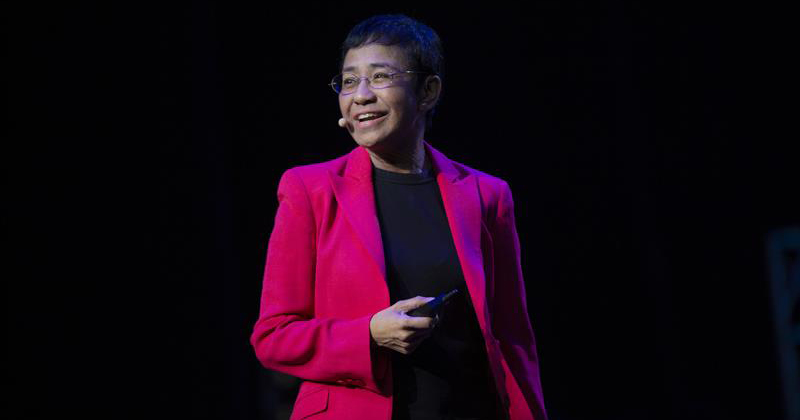


Nobel Peace laureate to visit UD virtually
Photo courtesy of Project Speakers April 25, 2022
Journalist Maria Ressa to speak about press freedom on April 27
Editor’s note: International travel issues will prevent Nobel Peace Prize winner Maria Ressa from appearing in person at the University of Delaware’s Mitchell Hall, as planned. She will deliver her presentation via Zoom to the audience at Mitchell Hall, beginning at 7 p.m., on Wednesday, April 27.
Maria Ressa, a 2021 Nobel Peace Prize-winning journalist, will visit the University of Delaware virtually on Wednesday, April 27, to speak about her fight for freedom of the press under the authoritarian regime of Philippine President Rodrigo Duterte.
Ressa’s talk, “Exposing Truth, Challenging Power,” will begin at 7 p.m. in Mitchell Hall on the University’s Newark campus. The event is free and open to the public; reservations are not required, but seating is limited. Doors will open at 6:15 p.m. Those attending must follow UD’s COVID health guidelines for visitors, including completing the Daily Health Check.
The event, hosted by the Department of Communication, will mark World Press Freedom Day, celebrated on May 3.
Ressa, a Filipino-American journalist who has worked in Asia for nearly 35 years, will be joined by Ralph Begleiter, Rosenberg Professor Emeritus of Communication, for a conversation about her career and current events. She and Begleiter were colleagues at CNN, where both worked as international journalists.
A co-founder of Rappler, the top digital-only news site leading the fight for freedom in the Philippines, Ressa has traveled the world speaking out about disinformation and fake news. She has been subjected to political harassment and arrests by the Duterte government and has been forced to post bail eight times to stay free.
Before founding Rappler, she focused on investigating terrorism in Southeast Asia. She opened and ran CNN's Manila Bureau for nearly a decade before opening the network's Jakarta Bureau, which she ran from 1995 to 2005. She is the author of Seeds of Terror: An Eyewitness Account of al-Qaeda's Newest Center of Operations in Southeast Asia and From Bin Laden to Facebook: 10 Days of Abduction, 10 Years of Terrorism."
In addition to the Nobel Peace Prize, Ressa has received numerous awards for her contributions to journalism and human rights. She was named Time Magazine's 2018 Person of the Year, was among its 100 Most Influential People of 2019, has been named one of Time's Most Influential Women of the Century and is a co-founder of The Real Facebook Oversight Board. She was also part of BBC’s “100 most inspiring and influential women of 2019” and Prospect magazine's “world's top 50 thinkers.”
The event at UD is part of the expansion of the Initiative on Free and Responsible Expression (I-FRE), developed by Jennifer Lambe, associate professor of communication, in a mission to conduct research and engage the public about issues where free expression conflicts with other important values.
According to Lambe, Ressa “exemplifies what a brave and committed journalist and newsroom leader can accomplish, even under the weight of an oppressive dictatorship."
Ressa, Lambe said, “calls out the role of internet companies in damaging our information ecosystem and points to economic imperatives that have allowed hate speech and misinformation to proliferate while quality journalism languishes."
About I-FRE
The April 27 event exemplifies I-FRE’s mission of exploring the tensions between hate speech and free speech generally, attempts to balance free speech and diversity efforts on college and university campuses specifically and efforts to improve information literacy and the quality of public discourse.
The initiative develops public programming and resources, including:
Events centered around Free Speech Week and World Freedom Press Day.
Symposia bringing together free speech scholars, nonprofit leaders, and activists to address freedom of speech issues.
Curricular materials and partnerships with middle and high schools regarding information literacy.
Training materials for college and university administrators, staff, and faculty on preparing for and responding to hate and bias incidents on their campuses.
A publicly available database of global efforts to respond to hate speech.
An annual study that assesses public attitudes toward free expression and effectiveness of interventions that teach information literacy and civil responses to harmful expression.
Contact Us
Have a UDaily story idea?
Contact us at ocm@udel.edu
Members of the press
Contact us at mediarelations@udel.edu or visit the Media Relations website

